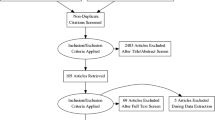Abstract
Until recently, children and young people’s perspectives have been largely overlooked in considering optimal approaches to supporting their wellbeing at school. This article reports student views on the meaning of ‘wellbeing’ and how this is best facilitated, gathered as part of a large, national research project aimed at understanding and improving approaches to wellbeing in schools. The data reported here were gathered through 67 focus groups, involving 606 primary and secondary school students, across three Catholic school regions in different Australian states. Students provided rich accounts of how they view their wellbeing, conceptualised across three interconnected themes of ‘being’, ‘having’ and ‘doing’. They identified relationships with self, teachers, friends, peers and significant others, as central to their wellbeing. The findings point to immense potential in accessing and utilising children and young people’s views for change and reform in schools in the area of student wellbeing.
Similar content being viewed by others
References
Amerijckx, G., & Humblet, C. (2014). Child-wellbeing: What does it mean? Children and Society, 28, 404–415.
Ben-Arieh, A. (2005). Where are the children? Children’s role in measuring and monitoring their wellbeing. Social Indicators Research, 74, 573–596.
Ben-Arieh, A. (2006). Measuring and monitoring the well-being of young children around the world. Paper commissioned for the EFA Global Monitoring report 2007—Strong foundations: Early childhood care and education (pp. 1–33).
Ben-Arieh, A. (2010). Developing indicators for child well-being in a changing context. In C. McAuley & W. Rose (Eds.), Child well-being: Understanding children’s lives. London: Jessica Kingsley Publishers.
Bingham, C. (2001). Schools of recognition: Identity politics and classroom practices. Lanham, MD: Rowman and Littlefield.
Bourke, L., & Geldens, P. (2007). What does wellbeing mean? Perspectives of wellbeing among young people & youth workers in rural Victoria. Youth Studies Australia, 26(1), 41–49.
Camfield, L., Streuli, N., & Woodhead, M. (2009). What’s the use of ‘well-being’ in contexts of child poverty? Approaches to research, monitoring and children’s participation. The International Journal of Children’s Rights, 17(1), 65–109.
Camfield, L., Streuli, N., & Woodhead, M. (2010). Children’s well-being in developing countries: A conceptual and methodological review. European Journal of Development Research, 22(3), 398–416.
Coombes, L., Appleton, J. V., Allen, D., & Yerrell, P. (2013). Emotional health and well-being in schools: Involving young people. Children and Society, 27(3), 220–232.
Ereaut, G., & Whiting, R. (2008). What do we mean by ‘wellbeing’? And why might it matter? Research Report DCSF-RW073. London: Department for Children, Schools and Families (DCSF).
Fattore, T., Mason, J., & Watson, E. (2007). Children’s conceptualisation(s) of their well-being. Social Indicators Research, 80, 5–29.
Fattore, T., Mason, J., & Watson, E. (2009). When children are asked about their well-being: Towards a framework for guiding policy. Child Indicators Research, 2(1), 57–77.
Frydenberg, E., Care, E., Freeman, E., & Chan, E. (2009). Interrelationships between coping, school connectedness and wellbeing. Australian Journal of Education, 53(3), 261–276.
Gallacher, L. A., & Gallagher, M. (2008). Methodological immaturity in childhood research? Thinking through participatory methods’. Childhood, 15(4), 499–516.
Gallagher, M., Haywood, S. L., Jones, M. W., & Milne, S. (2010). Negotiating informed consent with children in school-based research: A critical review. Children and Society, 24(6), 471–482.
Gillett-Swan, J. K. (2014). Investigating tween children’s capacity to conceptualise the complex issue of wellbeing. Global Studies of Childhood, 4(2), 64–76.
Graham, A., & Fitzgerald, R. (2010). Supporting children’s social and emotional wellbeing: Does having a say matter? Children and Society, 25(6), 447–457.
Graham, A., Powell, M., & Truscott, J. (2016). Facilitating student wellbeing: Relationships do matter. Educational Research, 58(4), 366–383.
Graham, A., Powell, M., Thomas, N., & Anderson, D. (2017). Reframing ‘well-being’ in schools: The potential of recognition. Cambridge Journal of Education, 47(4), 439–455.
Gray, J., & Hackling, M. (2009). Wellbeing and retention: A senior secondary student perspective. Australian Educational Researcher, 36(2), 119–145.
Hamilton, M., & Redmond, G. (2010). Conceptualisation of social and emotional wellbeing for children and young people, and policy implications. Sydney: Social Policy Research Centre.
Holdsworth, R. (2000). Schools that create real roles of value for young people. Prospects, 30(3), 349–362. https://doi.org/10.1007/bf02754058.
Honneth, A. (1995). The struggle for recognition: The moral grammar of social conflicts. Cambridge: Polity Press.
Honneth, A. (2001). Recognition or redistribution? Changing perspectives on the moral order of society. Theory, Culture & Society, 18(2–3), 43–55.
Honneth, A. (2004). Recognition and justice: Outline of a plural theory of justice. Acta Sociologica, 47(4), 351–364.
James, A., & James, A. (2008). Key concepts in childhood studies. London: Sage.
James, A., & Prout, A. (Eds.). (1997). Constructing and reconstructing childhood: Contemporary issues in the sociological study of childhood (2nd ed.). London: Falmer Press.
Liamputtong, P. (2009). Qualitative research methods (3rd ed.). Melbourne: Oxford.
Lippman, L. H., Moore, K. A., & McIntosh, H. (2011). Positive indicators of child well-being: A conceptual framework, measures, and methodological issues. Applied Research in Quality of Life, 6(4), 425–449.
Løhre, A., Lydersen, S., & Vatten, L. J. (2010). School wellbeing among children in grades 1–10. BMC Public Health, 10(1), 526.
Lundy, L., & McEvoy, L. (2012). Children’s rights and research processes: Assisting children to (in)formed views. Childhood, 19(1), 129–144.
Mazzei, L. A., & Jackson, A. Y. (2012). Complicating voice in a refusal to “let participants speak for themselves”. Qualitative Inquiry, 18(9), 745–751.
McLeod, J., & Wright, K. (2015). Inventing youth wellbeing. In J. McLeod & K. Wright (Eds.), Rethinking youth wellbeing (pp. 1–10). Singapore: Springer.
Mockler, N. (2014). When ‘research ethics’ become ‘everyday ethics’: The intersection of inquiry and practice in practitioner research. Educational Action Research, 22(2), 146–158.
Noble, T., McGrath, H., Wyatt, T., Carbines, R., & Robb, L. (2008). Scoping study into appraoches to student wellbeing: Final Report. Australian Catholic University: Report to the Department of Education, Employment and Workplace Relations, Erebus International: Report to the Department of Education, Employment and Workplace Relations.
Pollard, E., & Lee, P. (2003). Child well-being: A systematic review of the literature. Social Indicators Research, 61(1), 59–78.
Powell, M., & Graham, A. (2017). Wellbeing in schools: Examining the policy-practice nexus. Australian Educational Researcher, 44(2), 213–231.
Redmond, G., Skattebol, J., Saunders, P., Lietz, P., Zizzo, G., O’Grady, E., Tobin, M., Thomson, S., Maurici, V., Huynh, J., Moffat, A., Wong, M., Bradbury, B., & Roberts, K. (2016). Are the kids alright? Young Australians in their middle years: Final report of the Australian Child Wellbeing Project. Flinders University, University of New South Wales and Australian Council for Educational Research.
Reid, A., & McCallum, F. (2014). ‘Becoming your best’: student perspectives on community in the pursuit of aspirations. Australian Educational Researcher, 41(2), 195–207.
Sixsmith, J., Gabhainn, S., Fleming, C., & O’Higgins, S. (2007). Children’s, parents’ and teachers’ perceptions of child wellbeing. Health Education, 107(6), 511–523.
Skattebol, J., Hamilton, M., Skrzypiec, G., Burnstock, T., Redmond, G., Jenkins, B., & Dodd, K. (2013). Understanding children’s perspectives on wellbeing: Phase 1 Report Australian Child Wellbeing Project. Flinders University, the University of NSW and the Australian Council for Educational Research.
Soutter, A. (2011). What can we learn about wellbeing in school? Journal of Student Wellbeing, 5(1), 1–21.
Soutter, A., Gilmore, A., & O’Steen, B. (2011). How do high school youths’ educational experiences relate to well-being? Towards a trans-disciplinary conceptualization. Journal of Happiness Studies, 12, 591–631.
Taylor, C. (1994). The politics of recognition. In A. Gutmann (Ed.), Multiculturalism: Examining the politics of recognition. Princeton: Princeton University Press.
Thomas, N., Graham, A., Powell, M., & Fitzgerald, R. (2016). Conceptualisations of children’s wellbeing at school: The contribution of recognition theory. Childhood, 23(4), 506–520.
Urbis. (2011). The psychological and emotional wellbeing needs of children and young people: Models of effective practice in educational settings: Prepared for the Department of Education and Communities.
Watson, D., Emery, C., & Bayliss, P. (2012). Children’s social and emotional wellbeing in schools: A critical perspective. Bristol: Policy Press.
Webster, R. S. (2013). Healing the physical/spiritual divide through a holistic and hermeneutic approach to education. International Journal of Children’s Spirituality, 18(1), 62–73.
White, S. (2008). But what is wellbeing? A framework for analysis in social and development policy and practice. Paper presented at the Regeneration and wellbeing: Research into practice, University of Bradford.
Woodhead, M. (2009). Childhood studies: Past, present and future. In M. Kehily (Ed.), An introduction to childhood studies (2nd ed., pp. 17–34). London: Open University Press.
Wyn, J. (2007). Learning to ‘become somebody well:’ Challenges for educational policy. The Australian Educational Researcher, 34(3), 35–52.
Wyn, J., Cuervo, H., & Landstedt, E. (2015). The limits of wellbeing. In J. McLeod & K. Wright (Eds.), Rethinking youth wellbeing (pp. 55–70). Singapore: Springer.
Acknowledgements
We thank Julia Truscott for her assistance with the preparation of this manuscript.
Funding
This work was supported by the Australian Research Council under Grant LP110200656.
Author information
Authors and Affiliations
Corresponding author
Rights and permissions
About this article
Cite this article
Powell, M.A., Graham, A., Fitzgerald, R. et al. Wellbeing in schools: what do students tell us?. Aust. Educ. Res. 45, 515–531 (2018). https://doi.org/10.1007/s13384-018-0273-z
Received:
Accepted:
Published:
Issue Date:
DOI: https://doi.org/10.1007/s13384-018-0273-z



